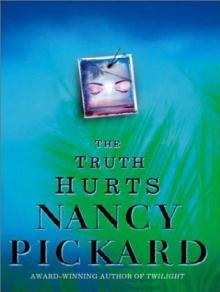- Home
- Nancy Pickard
The Blue Corn Murders Page 4
The Blue Corn Murders Read online
Page 4
What no one knew about her legendary rigid posture was that it was held up as much by straps and braces as by strong character. Arthritis was destroying her vertebrae; she remained standing by dint of fiberglass and steely will. The chronic pain made her cranky. She knew she was cranky, but she coldly observed that being cranky got things done in this lazy, slouching world. Her father—a banker of infamous cantankerousness—had taught her that by his example. From him she had learned that if you had to suffer pain, you could ease your discomfort by making the people around you pay for it. Make them do the grimacing for you, make them wince and feebly protest, so that you could maintain a heroically stoic demeanor.
Martina loved pure science and treated the scientists at Medicine Wheel with a respect she accorded no other human beings. She would do anything to assist them in their mission. In another generation she might have been an archaeologist herself, but the times and her father forbade it. After his early death she had gone to law school, then bullied her brothers out of her way in the bank, and now no one dared oust her from her office, which was larger and more centrally located than the president’s. She was the majority stockholder. She had outlived her parents, three out of four brothers, two husbands, and a child who had died at the age of sixty, still collecting a weekly allowance from his mother. She’d heard the town’s cruel joke: that he had died as a punishment for spending his allowance on comic books.
In the past, fools had learned to their regret not to question her allegiance—her passion—for the Wheel. With her Mexican heritage, they implied, why was she so devoted to the science of digging up Indian artifacts? She considered that a racist question and told them so.
She didn’t know how she would bear the hiking part of the tour, starting tomorrow. But something was rotten at the heart of her beloved Wheel, and she would find it and excise it, if she had to walk a hundred miles on crutches to do it.
Martina knew that Naomi was popular with the other trustees. But she also knew that popularity is a fickle lover who can desert you for reasons having little or nothing to do with right or wrong, with justice or with truth.
Her responsibility fulfilled, she locked her desk, then her office, and then the bank, thinking she would always rather be right than popular, especially if it meant proving other people wrong. That was deliciously satisfying, always. Just look how she had proved her father wrong. She was the born banker of her generation, not her spoiled brothers, the boys who had been sainted by their mother and anointed by their father.
She knew she could withstand any degree of physical pain if it was dedicated to the pursuit of the annihilation of her enemies and the validation of her own superiority.
From the look of the sky, snow was falling on Pike’s Peak.
She counted on the road to Cortez being cleared by morning and would be on the phone to the head of the Colorado highway department if it wasn’t. Assuming clear roads, she would start before dawn. Martina slept very little anyway and loathed wasting time almost as much as she hated wasting money.
At Medicine Wheel a student intern whose mother had practically made a career of yelling at him to close doors and turn off lights delivered two sets of luggage to hogan one: two suitcases, two bedrolls, two backpacks, and a couple of small totes. He piled them on the floor in the middle, right below where the smoke hole would be in a real Navajo home. Then he exited, pushing a luggage cart before him, leaving the lights on and the door open.
A few minutes later, along came a raccoon, chubby and slow as only a coon who lives near tourists can be. Savvy to the ways of college interns, she waddled right into hogan one. After sniffing around the perimeter fruitlessly, she nearsightedly found her way to the leather and canvas mountain in the middle.
The kitchen at the main lodge was always kept shut tight (tragically, from a raccoon’s point of view), as were the trash and recycling bins out back. But tourists could usually be relied on for crumbs and for open boxes of things crunchy or sweet.
This hogan was destined to be a disappointment, however, even when the clever animal worked back the zipper of the plastic bag that was sticking partway out of one of the totes.
With her little black fingers, the coon delicately plucked from the bag the first item she came to, sniffed it hopefully and tasted it with her tongue, and then tossed it aside disdainfully.
It rolled until it hit a wall and stopped.
The raccoon heard footsteps and skedaddled away as fast as she could waddle. Maybe pickings would improve at hogan two.
The student intern, delivering the next batch of luggage, spied the broad striped tail, saw the door he’d left open, and thought, Oh, shit.
“Git!” he yelled after her.
He was relieved to see nothing amiss in the hogan, except for a cosmetics bag hanging open.
He rezipped it and shoved it back in the tote.
Then he dumped the new load onto the floor against a wall, not noticing the little plastic bottle lying there, which was soon covered by the edge of another backpack.
This time on his way out he slammed the door, thinking how it would please his mother to see him do it. He was half right: he’d still forgotten to switch off the lights, and they glowed hospitably through the windows, giving the hogan the appearance of a cozy haven in the gathering darkness of that Sunday night.
Six
At about the same moment that Martina Alvarez was locking her bank and the raccoon was raiding the hogans, Genia found herself seated on a metal chair placed in a circle at a campfire. She felt tired but exhilarated. Around her, their faces illuminated by the flickering firelight and a harvest moon, sat eight people who were strangers to her. Seven women, one man, one empty chair. She glimpsed one dark complexion among the pale ones, all representing many different stages of life. The smoke from the fire smelled of piñon wood; the sparks climbed so high they seemed, to Genia’s willing imagination, to melt into the Milky Way.
The nine people—and one empty chair—sat in a small grassy meadow enclosed by aspen trees on three sides, as if held in their leafy embrace. A few yards behind Genia was a gravel parking lot, and beyond that the main lodge of the campus. Muffled sounds of voices came from up in the lodge, and the fire crackled and popped, but otherwise the night was quiet. They’d convened, smiling and nodding, but not saying much to one another yet. Now they’d fallen into a moment of deeper, expectant silence.
A strongly built woman wearing a colorful serape over a red sweater and long red skirt clapped her hands softly, once, as if to place a period at the end of the silence. To her right sat the only man in the group, a nice-looking bearded fellow, and to her left, a pigtailed girl. Something about the way the three of them related to one another as they sat down caused Genia to think they were all staff people, although the girl looked young enough to be their daughter.
The woman in the red serape spoke.
“Welcome to Medicine Wheel.”
Her smile was as warm as her words, and her glance traveled slowly around the circle to include everyone. Genia thought she saw shadows under the woman’s eyes and wondered if they were cast by firelight or by something else. She appeared to be in her late forties, maybe early fifties, and she was lushly attractive, with vivid coloring and thick graying black hair that she wore in a French braid that fell to the middle of her back. Her strong-looking hands were clasped in her skirted lap. On her feet were socks under thick, strapped brown sandals.
“I’m Naomi O’Neal,” she told them. “I’m the executive director of the Wheel. First, I’d like to introduce Jon Warren, our assistant director.” The bearded man on her right grinned at the group of women. “Jon won’t be with you on your hike, because he’s the lucky one who gets to lead sixteen teenagers on a six-day camp-out, starting tomorrow. But I wanted you to meet him.”
He interrupted her by joking, “Yeah, while I’m still alive.”
Smiling, Naomi gestured toward the girl in pigtails on her left. “And this is Dr. Susan Van Sant, w
ho will be your own personal archaeologist for the next few days.” Genia was astonished that the young woman, who didn’t look old enough to have graduated from high school, could be a degreed scientist. “The empty chair represents the final member of your group, who will arrive tomorrow. A couple of you have been here before.” The director’s warm, if tired, smile focused on two women in the circle, one of whom was seated beside Genia. “But you’ll just have to sit still for my introductions one more time.”
Genia saw those particular women glance at each other. The one across the circle, a woman with hair so gorgeously silver that it appeared to Genia to be reflecting moonlight, sighed melodramatically. “By now, I think I could give this introduction, Naomi,” she said. “You want me to save you the trouble?”
The director laughed. “You don’t really know what I’m going to say, Lillian, you only think you do. I have something new to add tonight.” She paused—for dramatic emphasis, Genia thought. “Perhaps I should tell you about our mountain lion?”
There were a couple of surprised gasps, and a general stir around the circle. The silver-haired woman named Lillian laughed and said, “Well, you’re right, Naomi, I could never have guessed you were going to say that. As opening sentences go, that’s a good one.”
Everybody else laughed, too, albeit a bit nervously.
“That settles it,” one of the other women joked. “I’m not leaving the hogan.”
“Does he eat tourists?” someone else asked.
The executive director’s tired smile acquired a mischievous twist. “So far,” she said, “he doesn’t seem to have developed a taste for tourists. But seriously, I do want to advise you that he has been sighted twice, not far from here. Susan here caught sight of him on her way home from work last week. He was just standing on a rock looking down at her truck. That was about a half mile from our main entrance, on the road to Mesa Verde.”
As one, the group looked east, where Mesa Verde, with its famous cliff dwellings, blacked out the lower quarter of the night sky. Above its dark flat profile, the heavens appeared to have been painted with the richest, most velvety dark blue color in nature’s palette, lightened only by brilliant Venus, a swath of stars, and the full harvest moon. The moon itself could have been a gold coin, tossed into the sky five hundred years earlier by an invading Spaniard.
The pigtailed archaeologist spoke up, sounding as young as she looked. “He’s a big sucker,” she said in a clear voice with a light British accent. “Scared me half to death when I realized what it was. At first, I just glimpsed this tan thing out of the corner of my eye, and I thought it was a deer. Then I got a real good look at him. And he got a real good look at me. Guess who blinked first?”
They all laughed sympathetically.
“That’s the second time we’ve seen him,” Naomi said, taking over again. “The first time, he walked right across the road in front of a van loaded with some of our student interns. That was a month ago. Just as bold as you please, they said, as if they were tourists in a wild animal park. From all accounts he really is a big guy, and just about as scared of people as a house cat might be. If you should happen to see him—”
A collective shudder ran around the circle.
“—please do remember that he is not a domestic feline! He comes armed with claws and huge teeth, and he must be considered extremely dangerous.”
Lillian murmured, “Here, kitty kitty kitty.”
“But I always thought,” another woman said, “that mountain lions are shy of people.”
“They are,” Naomi agreed. “We don’t know why this one’s so sure of himself.”
Suddenly, everyone was talking at once.
“Maybe he’s been to an assertiveness training workshop.”
“Aren’t they endangered?”
“Assertiveness training workshops?”
“As if. No. Mountain lions!”
“Not anymore.”
“I read they’re coming back all over the United States.”
“We’re the ones who will be endangered if they catch us.”
Genia joined the general hubbub and nervous laughter.
Then somebody asked: “Is that what I heard screaming up in the hills last night?” It was a question that stopped the chatter cold.
“Who heard an animal screaming?” Naomi inquired, looking around the circle to see who had spoken. When the lone black woman in the group raised her hand, Naomi said, “Are you sure it wasn’t one of our archaeologists? They go a little loony sometimes, out at the digs.” She grinned, as the archaeologist seated beside her poked her in the side with an elbow. “Ouch. No, it probably wasn’t our lion. Mountain lions usually do that scary screaming only in the spring when they’re courting. You probably heard a coyote.”
Genia blinked at that; she’d heard plenty of coyotes at her ranch, and they never “screamed.” The other women seemed satisfied with the explanation, however, and she didn’t see anything to be gained by debating the point.
The black woman put on a show of sighing in mock relief. “Coyotes, too? Gee, what a relief. I feel so much better now.”
Again, the group congenially laughed together. Genia felt herself growing happier and more relaxed with every passing moment around the campfire. She wished she had names to put to all of their faces, but soon, she knew, she would. So far it seemed an unusually congenial group of women, full of good humor and enough self-assurance to speak right up. Lillian, the one with the moonshine hair and outspoken sense of humor, looked as if she might be in her seventies, and Genia was somehow glad to know that she herself wasn’t the “elder” of the group.
“A few more words to the wise,” the director advised them. “In addition to watching out for mountain lions, that is. This is the part that Lillian and our other regulars know by heart. You’ll want to keep your hogan doors closed, because we have little mountain critters who are smart enough to figure out that where there are people, there is food. I’m pretty sure you don’t want to walk into your hogan one afternoon and find a skunk inside, or a porcupine, or even a mouse. We’ve been known to have to chase out the odd stray bird, too, and a couple of years ago, a big stag elk wandered into hogan three and helped himself to somebody’s stash of Snickers.”
Jon Warren spoke up. “That was interesting, getting him out. Ever try getting an elk with a full rack of antlers out of a narrow doorway?”
Across the circle the irrepressible Lillian pretended to speak seductively to an imaginary animal. “Just bend your head a little to the left, sweetheart, now to the right, now left, now try to slide on through …”
The young woman seated to Genia’s right got a fit of giggles upon hearing that, and her amusement was so contagious that Genia started laughing, too, and soon they had to wait a bit for everything to settle down enough for Naomi to continue.
“Now then,” she said, “let me see. What else do they need to know, Lillian?”
“Flashlight.”
“Right. Thank you. Yes, take a flashlight with you if you get up to go to the bathroom at night. That’s a small precaution against tripping over rocks or skunks in your way. Oh, and you’ve probably already noticed that we don’t have locks on any of the hogan doors, so please bring your cash and valuables up to my office, if you haven’t already, and I’ll secure them in our safe for you. Um—”
“Breakfast,” prodded Lillian.
“God, yes, breakfast is served from seven to nine, and our chef tolerates no latecomers. Anybody who’s late waits for the next scheduled mealtime, with no exceptions. Bingo’s not entirely hard-hearted, however. She will leave out apples and oranges and usually some kind of cookies or brownies, and we keep the coffee perking almost around the clock.”
She paused long enough to glance at each of them in turn.
“That should do it for the rules, for now. We don’t want you to think you’ve wandered into some military camp by mistake.” Once again her tired smile warmed the chilly night. “As our regulars
know, we have a tradition called the Talking Circle. I always like to start a new group with a Circle. We’re just going to go around the campfire and tell what brought us to this particular time and place in the universe. Perhaps we’ll begin to understand why this group of people has come together at this specific time, out of all other people and all other times. If I sound a little mystical, it’s because I’ve seen it happen so many times that a group of strangers grow to be good friends over the short time they’re together here, and there almost always seems to be some deeper meaning, some profound inner connection, if you will, that draws us together.”
She paused long enough for Genia to wonder, what next?
There was a feeling of bodies shifting and settling in, of throats clearing and sweaters being brought up more snugly around bodies. Genia sensed that with just those few sentences, the director had managed to guide the group into a deeper level of being together.
The darkness masked Naomi O’Neal’s face, so that her expression could no longer be read easily. “A Talking Circle works like this.” Her voice deepened, became calmer and quieter, and now Genia heard clearly a strain of weariness beneath it. “Each person gets to speak without interruption or comment from any of the rest of us. We’ll just listen. With compassion, if we can. Without judgment, if possible. We’ll begin with a simple ritual of music to set this off as a special time and place.”
Genia saw Jon Warren reach under his chair for something. A second or two later, amazing music filled the air. There was a steady drumbeat, like a Native American drum, but also other instruments playing a haunting melody like none that Genia had ever heard before. She closed her eyes and allowed the astonishing music to drift around her, to seep into her. It seemed to tug at the center of her chest, to beat softly, steadily on her heart. A small, long-forgotten grief pulsated briefly in her memory, followed by another memory, of her children, which was accompanied by a sweet surge of joy. She felt almost sorry when Naomi spoke again, over the music, which Jon turned down very low.

 The Scent of Rain and Lightning
The Scent of Rain and Lightning No Body
No Body The Secret Ingredient Murders: A Eugenia Potter Mystery
The Secret Ingredient Murders: A Eugenia Potter Mystery The 27-Ingredient Chili Con Carne Murders: A Eugenia Potter Mystery
The 27-Ingredient Chili Con Carne Murders: A Eugenia Potter Mystery Twilight
Twilight Marriage Is Murder
Marriage Is Murder I.O.U
I.O.U The Virgin of Small Plains
The Virgin of Small Plains Generous Death
Generous Death The Whole Truth
The Whole Truth The Blue Corn Murders
The Blue Corn Murders Say No to Murder
Say No to Murder Confession
Confession Dead Crazy
Dead Crazy The Truth Hurts
The Truth Hurts Bum Steer
Bum Steer